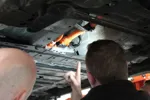Cap HPI has responded to reports that diesel car values had seen residual value drops of as much as 26% since the start of the year - claiming that the figure amounted to "harmful scaremongering".
Car buying comparison site Motorway.co.uk claimed that data compiled through analysis of 24,000 used car valuations showed that the average used values of many popular diesel models had dropped by an average of 5.7%, with some models falling by as much as 26%.
But experts at Cap HPI claimed that the headline-grabbing 26% figure – the claimed depreciation of a diesel Vauxhall Corsa – and other lofty deprecation figures for individual models were way off the mark, a claim disputed by Motorway.co.uk.
Andrew Mee, the senior forecasting editor at Cap HPI, said: “It’s a fact of life that cars devalue over time. This sort of scaremongering is harmful to the market and has no basis in fact.”
Tom Leathes, chief executive Motorway.co.uk said that his business was “not in the business of scaremongering”, adding that the data gathered by his team was factual and drawn from “a large number of real, live valuations from multiple online car buyers in the market throughout 2017”.
On average Cap HPI found that a three-year-old diesel car has depreciated by 10.5% since the start of the year in its own data, albeit compared with the historical seasonal expectation of 8.5% – higher than the average figure stated by Motorway.co.uk.
Cap HPI said that there is variation by sector and diesel Lower Medium (C-Segment) cars have only depreciated by 9.2%.
The used car data specialists sought to highlight that the data quoted by Motorway.co.uk in its reports had cited no age, mileage or condition and was based on website valuation records rather than a wider market view of transacted sales values.
Up to the end of August, Cap HPI has processed over 1.2 million trade sales records, and typically received over 600,000 advertised retail prices daily.
Cap HPI claims a true picture is shown by its year-on-year deflation analysis of black book values that compare the trade CAP Clean values, the current value of a specific Cap ID at a specific age and mileage, and the value if the same ID at the same age and mileage one year previously.
Mee said: “There is nothing to support a collapse in diesel values. Corsa diesels have not fallen by 26% since Q1 and VW Polo petrols have not risen by 19%.
“While there is variation by sector, overall diesel depreciation year to date is only around -2% worse than the historical average. Talk of ‘white elephants’ is extremely ill-informed. In fact, diesel depreciation in the past two months has been slightly better than average for the time of year.”
Responding to Cap HPI’s comments on Motorway.co.uk’s findings, Leathes said: “This data shows very clear trends in overall diesel values dropping more rapidly than petrol, which CAP themselves underline – with their own data also showing an accelerated depreciation of diesel cars.
Leathes said that criticism of Motorway.co.uk’s inclusion of all ages of each vehicle model in its analysis shows a fundamental misinterpretation of the data it released.
He said: “The data we released is a rolling average of car values over time, not simply the depreciation trends for each model.
“This is why some vehicles in our dataset have increased in value, on average. We included all variants and years for each make/model because this gives a true picture for average values.
“In each quarter, newer and older cars are included, and more recent months include newer vehicles, thus resulting in a rolling average.”
Cap HPI’s analysis of depreciation from January 2017 to September 2017 shows the petrol sector improved throughout 2017, with petrol vehicles having seen record low depreciation in recent months.
Overall, petrol values are now in a state of inflation, with three-year-old examples with 60,000 miles worth more than the equivalent age and mileage cars a year ago.













Login to comment
Comments
No comments have been made yet.